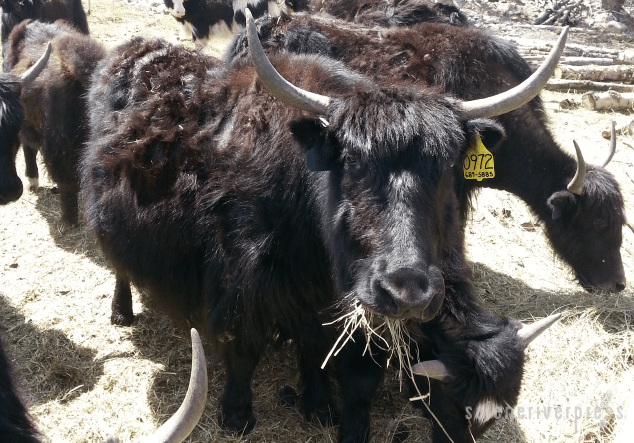Ever had yak for dinner? I did, and it was tender, buttery, and rich, although lean. And it wasn’t gamey at all. You may think it was shipped overnight from Tibet, but you’d be wrong—it was raised right here in Colorado. The state has about 20 ranches that raise yaks for meat, and the trend is growing for many good reasons.
My steak came from a yak raised in a scenic spot in Rist Canyon, where a herd of 27 yaks roam free range at the Morrow family’s Happy Yak Ranch. The men of the Morrow clan include David and his sons Colby, Bryan, Dylan, and Riley. Colby says the idea for raising yaks came during a visit to the Denver Stock Show. They wanted to add a few cows to the ranch, but their curiosity was sparked when they saw the yaks. After some research, the Morrows learned what other ranchers in the state are learning: yaks offer many advantages over traditional cattle.

It also didn’t take the Morrow family long to appreciate that yaks have several qualities that make them a natural fit for their ranch. “Yaks are as close to organic as you can get,” David says, describing his family’s desire to practice permaculture and other sustainable approaches to raising meat and ranching.
Colby goes on to note several of their positive qualities, including the fact that yaks are relatively quiet, odorless, and clean compared to cattle. “They don’t moo and they don’t wallow,” he says. In addition, yaks eat only one-third of what cattle do, so they’re easy on the land as far as grazing. And because yaks are considered exotic animals, they’re not bound by the same laws and regulations as traditional livestock.
But while yaks are a great alternative to beef, their value extends beyond meat. They also provide milk, and their wool, hair, hide, and skulls are prized for many other uses. With their intimidating horns, they’re great as guard animals for smaller livestock. The Morrows even use one of the older yaks to protect their sheep from coyote attacks.
Though the Morrows plan on getting milk from their yaks someday, they haven’t gotten there yet—but they will. And when they do, I’ll be one of the first in line to try yak butter tea. Say yes to yak and secure your place in line to take advantage of this old trend that’s new again.
For more information, visit Happy Yak Ranch or contact Colby Morrow via colbymorrow@ymail.com or 970-980-4803.


